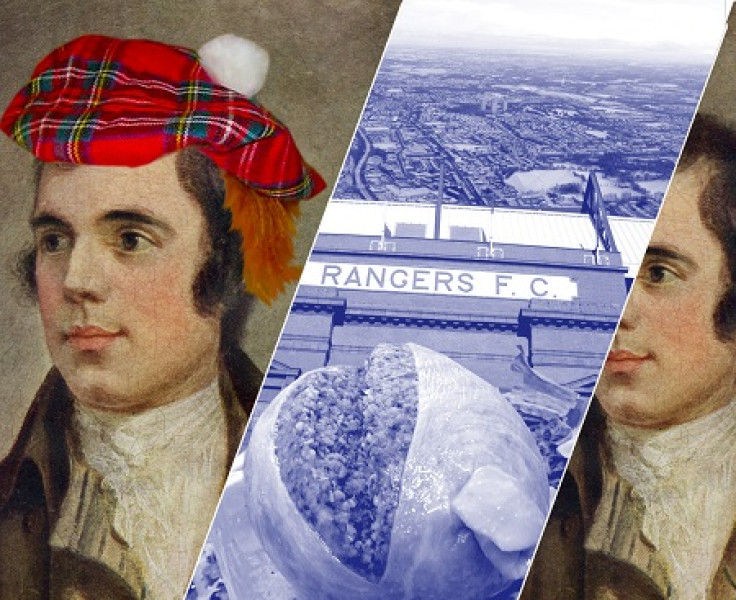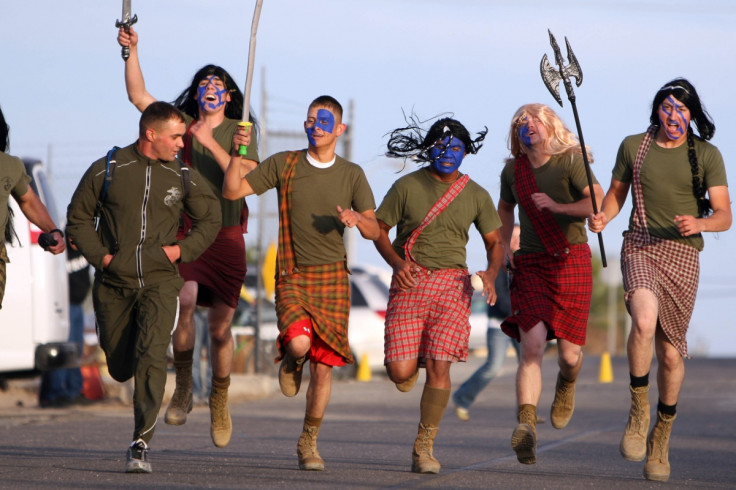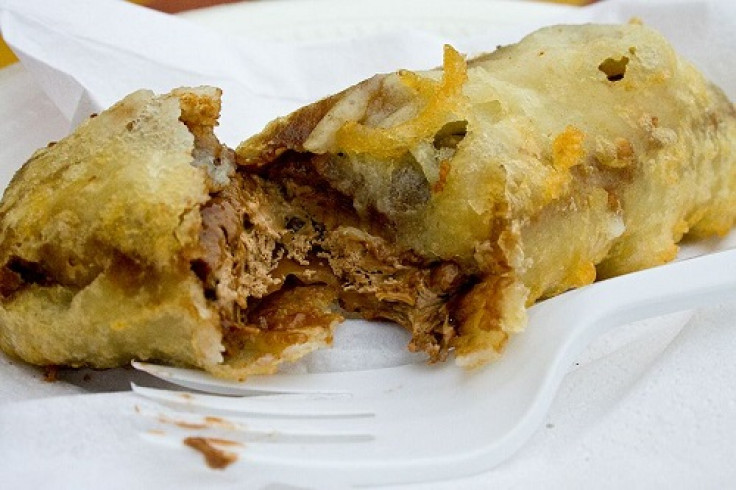Scotland: Is this the Last Burns Night under British Rule?
Burns Night to ring with 'O wad some Power the giftie gie us/To see oursels as ithers see us!'

This Burns Night could well be the last one Scotland celebrates as a part of the UK.
In a year of increasingly ramped-up national politics, culture, sport and marketing, the night of 25 January will be an important marker.
Enthusiastic nationalists may look beyond the traditional Burns canon in search of examples of his poetry that better serves their political agendas.
But in the case of Burns, like a lot of things in Scotland, look closely and you will find contradictions.
Burns was a radical and a socialist: a poet of the common man, who died in poverty. Of course he was a nationalist.
However, we are also reminded that Burns had a job as an excise man. In other words he became a minor civil servant working for the British government.
Some might add that Burns was something of an opportunist who had tempered his radical views accordingly. And that he died with full military honours, his corpse clothed in the uniform of the Royal Dumfries Volunteers.
It's interesting that there are so many perspectives of a man who wrote the penetrating lines:
"O wad some Power the giftie gie us
To see oursels as ithers see us!"
Robert Burns was born in 1759, not long after the second Jacobite rebellion of 1745, which was partly a reaction to the hugely unpopular Act of Union of 1707.
Two major cultural events in Scotland have shaped what could be called the history of the present: the Scottish Poll Tax riots, and the film Braveheart.
Scotland's merchants and bankers had been bankrupted by the disastrous Darien project in Panama. In vaguely familiar fashion they been bailed out by their English counterparts, on condition that both parliaments united in London.
In Burns' famous lament, the vast majority of Scottish people were "Bought and sold for English gold".
In my own lifetime, I believe two major cultural events in Scotland have shaped what could be called the history of the present: the Scottish Poll Tax riots, and the film Braveheart.

Margaret Thatcher's Conservative government decided it would be a good idea to test-drive the poll tax on the Scots. Nobody has ever apologised for this, and Scottish people have never forgotten it.
More than just a lasting hatred of the Tories (lots of people hate them after all), this created a deep rift and an entrenched distrust of Westminster among average Scots.
In Braveheart the Scottish people are depicted as underdogs and heroes; the English, by contrast, appear to be underhanded perverts - which, of course, is true.
Wallace mythology was big with Burns as well. In one of his letters the Bard states: "The story of Wallace poured a Scottish prejudice in my veins which will boil alang there till the flood-gates of life shut in eternal rest."
We can expect September's referendum to be close, rending Scotland into those who are divided, opportunistic, cautious, politically conflicted - just like its famous Bard.
It's not commonly known, but the SNP used to pay for busloads of pensioners to be transported from rural areas in Scotland to the nearest towns, where they could be regaled with matinee performances of Braveheart.
The SNP is always ready to go the extra mile. We can expect September's referendum to be close, rending Scotland into those who are divided, opportunistic, cautious, politically conflicted - just like its famous Bard.
Remember Walter Benjamin's warning about the contradictory nature of history: "There is no document of civilisation which is not at the same time a document of barbarism".
With this split national identity in mind, I have listed some other typically Scottish motifs of a contradictory bent.
Strange Case of Dr Jekyll and Mr Hyde
If Burns was Scotland's greatest poet, Robert Louis Stevenson was its greatest storyteller. Stevenson's good doctor was an effete Edinburgh gentleman; Hyde represents the dark, animalistic side we all keep in check.
The theme of doubles and evil dopplegangers also appears in the brilliant, largely unknown novel Confessions of a Justified Sinner by James Hogg, a contemporary of Burns who was also a lowland shepherd.
The Highlands
People get all teary-eyed thinking about the Highlands. But these are almost always people who don't have to live there, or English people who have moved there and set up vegan pottery outlets or bed and breakfasts. Or people who may have acquired a modest highland retreat which they visit occasionally, like the Queen.

The Three-in-One
Food rarely comes in a more counter-intuitive form than a deep-fried Mars bar. Some think this delicacy may have originated from the famous Three-in-One takeaway in Glasgow's Possilpark area.
People in Glasgow are proud of the now iconic deep-fried Mars bar – and rightly so: it's become a tourist thing.
The Hydra-like three-in-one concept combines a chippy, kebabbie and pizzeria in one franchise. Old hat, you might say, but it was an instant sensation back in the day, and copycat versions of similar spread across Glasgow like a wave of Saturday night vomit. Unsurprisingly, it has been the handmaiden of a number of unusual cross-fertilisations within the fast food arena, like the donner pizza, for instance.
People in Glasgow are proud of the now iconic deep-fried Mars bar – and rightly so: it's become a tourist thing. But I would say more challenging - especially in a coronary heart capacity - is the deep fried pizza supper. This is where a cheap and nasty Margherita pizza is folded in half and completely submerged in five-day-old boiling animal fat, then served with chips. Imagine tossing a sponge into a bucket of motor oil; it's not that dissimilar.
Alcoholism
When it comes to alcohol the Scots tend to view drinkers from other countries - with the possible exception of Finland - as amateurs. Oh yes. Tell people in Scotland you think you might be an alcoholic and generally they will buy you a drink.
Glasgow Rangers
Oddly enough the most pro-royal people on the planet live in Glasgow. Even more puzzling is the that their respect for the Queen and the United Kingdom only exists by virtue of their hatred of Celtic Football club in particular, and Catholics in general.
It's not unusual for true "blue nose" 'Gers fans to have signed pictures of the Her Majesty Queen Elizabeth framed and up on the wall. Pity this fervent, if misplaced, patriotism didn't save Rangers from bankruptcy and ignominy - relegated to the lower Scottish football divisions, which is very low indeed.
Blairgowrie
Thanks to its astonishing capacity to cultivate berries, this picturesque town on the east side of Scotland has been dubbed "The Big Raspberry". However, I prefer its more mystical and esoteric title: "The Gateway to Nowhere".
The World Cup
In the unlikely event that Scotland were to qualify for a World Cup tournament, under no circumstances should you travel there to see them, unless you happen to be some sort of skirt-wearing masochist (which covers most of the population).
Scotland has an atrocious international record, particularly when faced with unranked Arab nations or groups of part-time fishermen from the Faroes. However, Scots of a certain age will always remember Argentina, where Archibald Gemmill single-handedly ravished the Dutch defence.
The Central Belt
The area between Edinburgh and Glasgow is home to the connecting M8 motorway, and not much else. In the words of the Starship Enterprise, it's like entering "an anti-matter universe".
Mince
Mince is completely versatile and people in Scotland eat lots of it, exploring a variety of serving suggestions. A haggis is just a big ball of mince after all, wrapped in a sheep's intestinal sack. This provides a means of taking your mince in pudding form, battered, fried and served with chips. Yummy.
Notice how mince turns grey when it's cooked. People in Scotland sometimes appear to be a bit grey – a result of excessive mince consumption.
© Copyright IBTimes 2024. All rights reserved.






